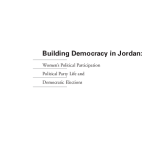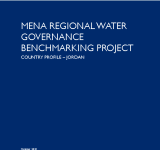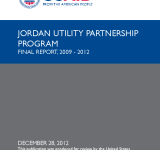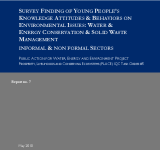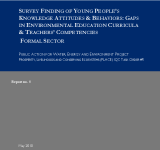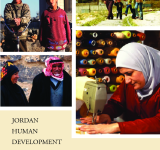building
يأتي هذا التقرير استمراراً لتراكم الجهود التي بدأت مع تقريري المعرفة الأول والثاني، ومواصلة تشخيص الإمكانات والآليات التي تمكن المنطقة العربية من تحقيق هدف بناء مجتمع المعرفة، والمشاركة في بناء
The report is a Jordan country profile of the Regional Water Governance Benchmarking Project (ReWaB) and the results assessment of the project. The ReWaB is a project that aims to establish a system of water governance capacity and performance benchmarking for Middle East and North Africa countries. The report resents the projects' approach to water governance benchmarking;; brief overview of the political;; economic;; and social situation in Jordan;; the country's water availability;; and it also outlines the main users and managers of Jordan's limited water resources and identifies relevant trans boundary issues. With a description of the main actors in Jordan's water governance and their influence on functional performance;; the report presents and discusses the main findings of the Policy and Legal Analysis and the expert-based assessment;; which gauged the functional effectiveness of the Jordanian water sector and application of good governance processes in water-related decision-making. The report concludes by highlighting Jordan's organizing and building capacity and strategic planning in policy documents. It also notes areas with potential challenges such as the broad function of allocating water and mechanisms for water trades and complimentary conflict mitigation.
This publication aims to summarize and assess the results of the United States Energy Association (USEA)’s Jordan Energy Partnership Project (JUPP);; funded by the USAID. The JUPP is part of the USEA/USAID Energy Utility Partnership Program (EUPP);; which assists developing countries with increasing environmentally sustainable energy production and use and improving the operational efficiency and increased financial viability of their utilities and related institutions. The JUPP focuses on improving the technical and operational efficiency of Jordan’s electric utilities and electric grid. Defining energy insecurity as one of the most significant problems in Jordan;; the report summarizes the program’s activities and assesses their results and impacts. It looks at multiple aspects including the utility participant training and female participation. The results of the publication are increasing system efficiency;; developing customer energy efficiency programs;; increasing corporate efficiency;; supporting capacity building;; reducing electricity losses and power outages;; improving transmission dispatch center operations;; enhancing worker productivity through safety and interconnecting renewable energy and distributed generation. The report concludes with key lessons learned from the projects.
The report explores the level of knowledge;; attitudes held and practices observed by young people towards environmental issues related to water and energy conservation and sold waste management. It maps out available resources;; programs and learning opportunities in the informal and non-formal education sectors;; through which positive environmental attitudes can be encouraged and promoted. The survey of the report assess the knowledge;; attitudes and practices of young people aged 7 -24;; educations;; staff and youth workers to identify strengths and areas for improvement through capacity building and explore existing resources;; programs to evaluate their effectiveness. This research was conducted as part of the Public Action for Water;; Energy and Environment Project (PAP);; which aims to encourage water and energy conservation and to support behavior change towards more conservation and efficient practices both at the household level and in the commercial;; industrial and civil society arenas using social marketing behavioral methods. The study concludes that there is a need for more “green” programs that involve youth in a proactive way and therefore;; it recommends that programs targeting youth need to remain positive;; dynamic and in context. The recommendations of the report include development of environmental resources in the Arabic language;; the youth-led;; peer-led programs that involve participatory learning opportunities;; and social media tools to raise interests;; awareness and creation of environmental education task force.
The report aims to learn about young people's knowledge;; attitudes;; and behaviors with regards to water conservation;; energy conservation;; and waste management;; and it assess these against the learning objectives of the curriculum. It discovers that students' knowledge was sufficient and at times more sophisticated than that founded in the curriculum even though their attitudes and behaviors remain largely unchanged. The object of the survey pertains to the objectives of the Public Action for Water;; Energy;; and Environment Project;; which revolve around education for young people;; teachers and youth leaders to develop their knowledge and ethical values and attitudes. The survey focuses on assessing young people and educator's current awareness of water and energy resources and waste reduction and evaluating formal curriculum resources. The report points at the gap of translating young people's knowledge into genuine interest;; concern and action and proposes set of targeted actions including development of relevant resources and additional supplemental materials;; age-relevant projects to support environmental concepts in the national curriculum and assignment of environmental coordinator at all schools.
This report consists of eight chapters and aims to summarise the key concepts of human development. It introduces the Human Development Index;; provides an overview of Jordan's human development achievements;; examines the regional vulnerability context that has constrained Jordan's options in its pursuit of social and economic development;; provides a platform for the poor to express their views and perceptions in relation to their poverty status;; reviews the policies;; institutions and processes that affect the poor;; examines the government's attempts to stimulate entrepreneurialism;; promotes the application of a rights-based approach;; in which all citizen are equally empowered and have the capacity and the appropriate enabling environment that allows them to claim their entitlements according to law. Finally;; the study examines the various reform initiatives in progress and assesses the extent to which Jordan is committed to the process.
